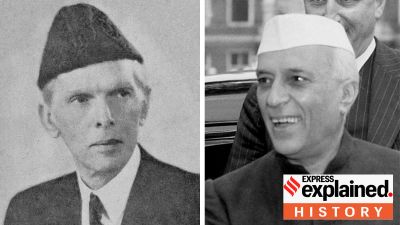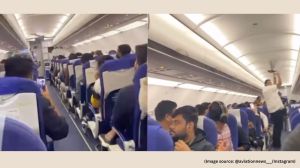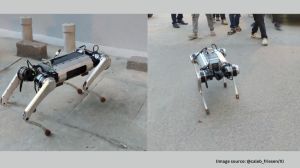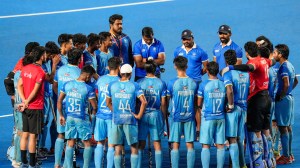NHAI in jam as flyover calls clog GQ
When Lance Naik Aman Yadav of 7 Maratha Light Infantry came home for the holidays from Kargil, he picked his way through a puzzling barricad...

When Lance Naik Aman Yadav of 7 Maratha Light Infantry came home for the holidays from Kargil, he picked his way through a puzzling barricade of red and white tape fluttering by his highway home, the ‘‘100 per cent military village’’ of Khindwadi, Satara.
There was rubble but no sign of work. If Aman had driven down the NH-4 from Mumbai he would have seen more red and white tape marking stop-work stretches on the Golden Quadrilateral as Pune’s expressway slipped away and Satara-special milk tankers lumbered into view.
Now what makes a disciplined village sending its boys to the Army take to the streets against the Prime Minister’s dream highway? Flyovers. For rural Maharashtra all along the Pune-Kolhapur route has developed a special fancy for them. From Khindwadi to Satara and Kolhapur, farmers and retired teachers are putting their work aside to hold rasta rokos, demanding flyovers, and underpasses and service roads, before the state-of-the-art highway races past their backyards.
‘‘Golden Quadrilateral? Means what?’’ says Laxmanrao Patil, the Nationalist Congress Party (NCP) MP from Satara. Patil has been signing letters of recommendations to pander to the villagers’ new fancy, leaving the National Highway Authority of India (NHAI) splitting hair. ‘‘You know how it is. How can an elected representative say no for a recommendation?’’
So as excavators gouge out dry, arid earth and towering hot mix plants spring all over the 110-km, Rs 400-crore stretch between Pune and Satara, protests by villagers are becoming almost as ubiquitous as the roadside Punjabi dhaba.
Some are so polite, they send a fax to NHAI well in advance. Others simply pelt stones as NHAI machines rumble along. Recently, an additional flyover, one service road and one underpass for Satara were accepted by NHAI ‘‘in principle’’. The cost of Satara’s protests: an extra Rs 10 crore and six to eight months of additional work if all demands are accepted. Forget four lanes, by the deadline of December 2003, only 70 per cent of the two new lanes till Satara are expected to be complete, 60 per cent up to Kolhapur.
But the demands are far from ending, with Satara alone seeking two flyovers and four underpasses. At Khindwadi, sarpanch Vasanti Kudalkar takes time off from tailoring blouses to say a service road is not enough, they want an underpass.
‘‘How will cows cross the road? Our farm land is on the other side of the highway also. A special flyover would be nice but all we have been demanding for two years is an underpass. So we organised a rasta roko and stopped work since last month.’’
NHAI’s hassled Manager (Technical), Venkata Rama Rao Kaza, says: ‘‘Every 5 km a village wants a flyover or an underpass because they heard that another village got it by a rasta roko. They don’t care for design specifications…They are capable of halting work all along the 35 km between Satara and Wathar. Last month (March) they halted work at seven sites. It’s a fashion here. When they see our machines they throw stones.’’
Rao has a collection of such protest faxes. A recent fax from police informs that ‘‘students and teachers of the polytechnic college at Satara and gram panchayat of Khindwadi, Kodoli, Shelkewadi and Karandi village are arranging a rasta roko to demand a service road. You are requested to be present at 10 am and take the application.’’
Says Lance Naik Aman: ‘‘My father crosses the highway every day because our farm is on the other side. A 20-year-old boy was killed on the road two years ago.’’
Autorickshaw driver Prashant Kudalkar argues: ‘‘We have military men in Kargil and Punjab. They return home for holidays, mostly at night. What if there’s an accident?’’
In Pune, NHAI Project Director for Mumbai-Kolhapur, Manohar Ashtavadhani, plays the diplomat. ‘‘We requested police protection but we are not insisting because we don’t want bitterness.’’ He has also scaled down expectations: ‘‘Two new lanes by December 2003. The rest, next year.’’ While he adds that ground conditions are not suitable for additions to design, Ashtavadhani hopes for a compromise by May 30, after meeting local politicians and leaders.
|
Satara Shivraj Petrol Pump junction where GQ is stalled over an
underpass. Ramesh Nair |
He hints that the protesters have political backing. ‘‘How and when (to build flyovers) is under consideration. Let us finish four-laning and we’ll give them what they want.’’
Right now, there aren’t enough roadsigns of a compromise. Groping through duststorms to enter Indiranagar in Satara, you bump into retired maths and science school teacher N.K. Duke earnestly courting arrest. Duke, the organising secretary of a 500-strong rasta roko that had stalled this site’s work for almost a month since mid-March, says he has telephoned Pune’s NHAI project director 30 times to demand an underpass outside a settlement of middle-class colonies.
‘‘On one side are 40 societies, plus a primary school. Karad and Kolhapur traffic rattles along this highway. How can our women and children cross at night?’’
NHAI has earmarked an underpass for this area but petulant locals say they want to decide where. MP Patil told The Indian Express he does not approve protests but admits he wrote a recommendation in February. ‘‘The demand made by residents of 40 societies is true and considerable so I strongly recommend the proposal,’’ it says.
On Pune’s edge, a 34-km westerly bypass is almost complete but a 10.07-km, Rs 96.26-crore Katraj Ghat bypass with two new tunnels is crawling at 10 per cent progress. Beyond the 90-km Mumbai-Pune expressway on NH-4, Pune-Satara four-laning was progressing between 26 and 55 per cent by April. Traffic congestion peaks at 90,000 passenger car units daily.
Flyover tantrums spout up to Kolhapur, with work at an average 12.6 per cent progress. At Umbraj village, fashionably labelled Pune-Bangalore village, 196 structures will be demolished for the highway, but locals tried very hard for a flyover.
Sandeep Khalate, Assistant Engineer with Maharashtra State Road Development Corporation, says: ‘‘The 1-km elevated highway through Umbraj will cost Rs 8 crore. The flyover they want will double the cost. We decided against it and and we’ve sent them our last notice.’’
Ironically, NHAI’s Shirwal office, amidst chikoo trees on Pune-Satara Road, wears a computer printout: ‘‘Worry is our enemy. The cause of psychotic problems, heart problems and many other problems.’’ For the time being, at least, NHAI has no way around them.
(Tomorrow: Highway of the future on Delhi-Jaipur road)
PREVIOUSLY
PART IV: Where people roll out the red carpet
PART III: Its plate full, NHAI faces fields of rice
PART II: Running into Great Wall of China in UP
PART I: The Great Indian Road Show Crawls
- 01
- 02
- 03
- 04
- 05































